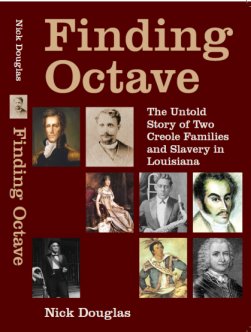> Back to the List of Publications
Nick Douglas: Finding Octave: The Untold Story of Two Creole Families and Slavery in Louisiana (2013)
318 p., CreateSpace Independent Publishing Platform, 2013, ISBN-10: 1493522086

Publisher's note:
With a flash of recognition, the author meets the gaze of his ancestor in a sepia-toned photo. Knowing next to nothing about this man, his great-great-grandfather Octave, he follows two families that lead to his own. On a journey stretching from Haiti to India, and back to the 16th century, the author’s adventures strangely echo those of his ancestors.Finding Octave reveals an American history erased and forgotten, even by descendants of those who lived it. It tells of ancestors who influenced the flowering of jazz, the birth of the 15th Amendment, the love life of an empress and the legacy of Simon Bolivar—and a landmark battle to overturn segregation. And it tells the story of Octave Pavageau, the stylish, French-speaking father of eight whose heritage led to both hurtful elitism and path-breaking activism. In Finding Octave, we find Basil Crocker, mathematician, builder, and dandy. A master swordsman in a time of increasing white hostility and attacks, Crocker became New Orleans’ most sought-after fencing instructor. Emile Angeletty, a black Catholic in Mississippi, resisted a Church plan to segregate worshippers. He and other Catholics started the Holy Family Parish in Natchez, and upheld more tolerant practices. Adele Pavageau was a New Orleans land magnate, Octave’s aunt, and an international businesswoman. This is not another American history of black slaves and dominant whites. Finding Octave finds an America where “free people of color”—unfettered blacks, Indians and Creoles—had power and wealth that whites struggled to claim as their own. In this pre-Civil War America, blacks negotiated their own freedom from slavery. Some chose to be slaveholders themselves. Confronting the terrible truth about slavery within his family, the author uncovers an American secret. Born of the harmony of different worlds and peoples, Octave’s Creole legacy is a source of enduring strength. His relatives were confident world citizens, and proud of their ancestry. They travelled widely, conducted international trade, and defined themselves as black, white or Creole as it suited them. They gravitated to city life, forming collaborative urban networks that infused New Orleans with artistic innovators, dynamic entrepreneurs, an array of social services, and crusades for social change. Join the author of Finding Octave to discover “the vigor, heart and tenacity of my ancestors and other people of color, the vitality and determination essential to what America still can be.”
Nick Douglas is an MBA with a background in international business. He grew up in a multi-generational Creole home in Oakland, California.
Table of Content
Section I Beginning the Journey
Acknowledgements
Chapter 1 A Picture of American History 1
Chapter 2 A New Creole Reality 4
Chapter 3 Finding Octave: The Journey Begins 13
Section II The Pavageaus’ Path to New Orleans
Chapter 4 Making Millions, Tangling with an Empress 18
Chapter 5 Two Rescues of Simon Bolivar 27
Chapter 6 Shadows of Revolt 31
Section III The Hazeurs: First Europeans, First Creoles
Chapter 7 Traders, Merchants, Soldiers 43
Chapter 8 Spying, Nosebleeds and the Princess who Stopped Abolition 49
Chapter 9 The Last Three Hours 62
Section IV The Hazeurs and “Colonial Weakness”
Chapter 10 Two Plantations, Three French Knights 69
Chapter 11 A Sister’s Gift, with Love and Fondness 78
Chapter 12 Familial Faces: In the Wake of Revolt 84
Section V Saving New Orleans, Moving to Mexico
Chapter 13 Polyglot Soldiers 89
Chapter 14 Octave’s Father: Activist, Slaveholder, Magnate 96
Chapter 15 Hazeur Musicians, Farmers, Tradesmen 102
Chapter 16 On the Heels of Juarez 109
Section VI Slavery, Activism and the Black Vote
Chapter 17
More Shameful than Being a Slave 120
Chapter 18 Long Before Selma 138
Chapter 19 Letting Lincoln Know: The Petition for Black Suffrage 145
Chapter 20 Octave in the Middle of History 163
Chapter 21 A Young Woman Singing 173
Section VII My Family and Jazz
Chapter 22 The Joys of Pâté 181
Chapter 23 The Mexican Road to Jazz 185
Chapter 24 My Family and Jazz 191
Chapter 25 Created Like Creoles Were 203
Section VIII Departures
Chapter 26 Leaving the Knights’ Plantation 207
Chapter 27 New Orleans, One Block Long 210
Section IX From the Sewing Room to Finding Octave
Chapter 28 Tall Tales, Errors, and Leaving the Truth Behind 222
Chapter 29 Passing and the Fallacy of One Toxic Drop 254
Chapter 30 Finding Octave: Within the Colorful Array 266
Epilogue 271
Supplemental Historical Data and Family Trees
Code Noir 272
Pavageau family trees 277
Ancar land certificate 279
Angeletty and Angeletti 1900 Census records 280
Bibliography 283
Index 288
Endnotes 298






